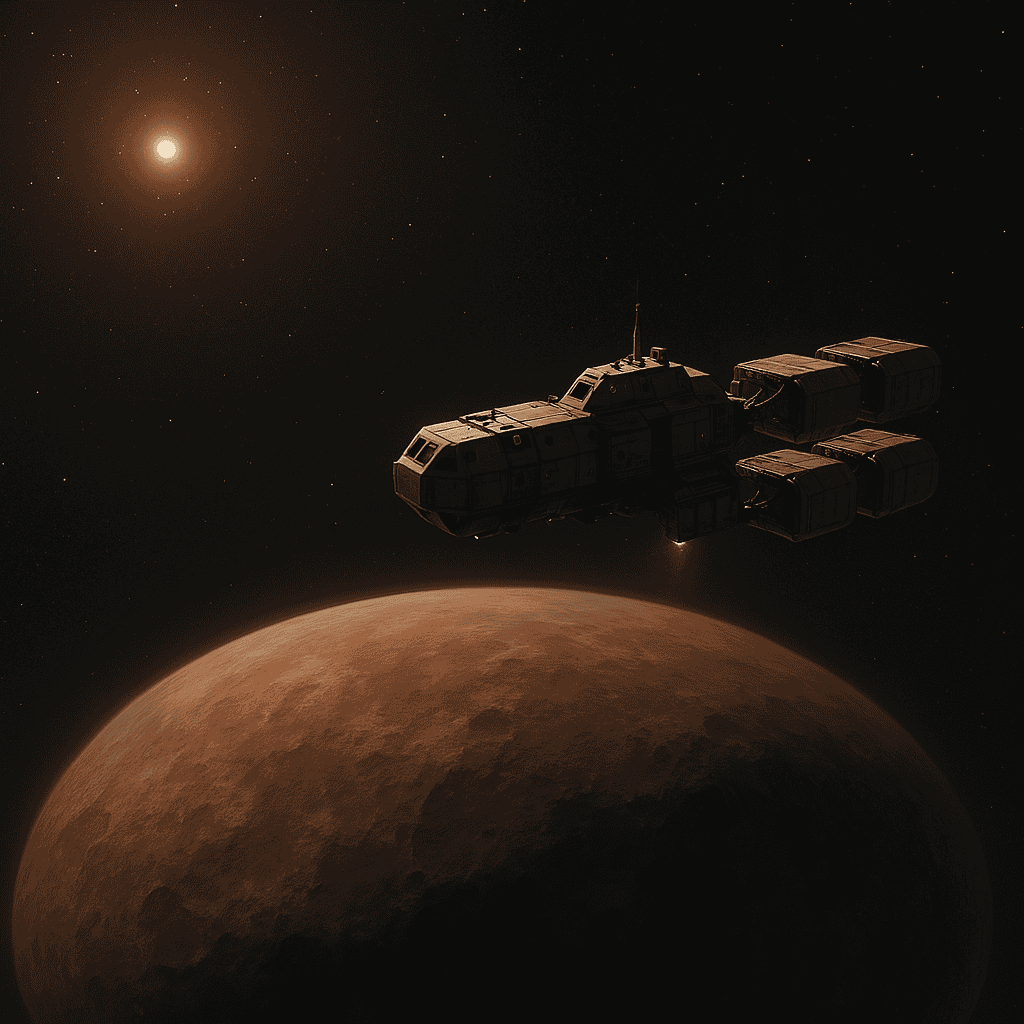Prospects
After months of induced sleep, the crew had come to live by ritual. Early this morning, Captain Declan Garrett and astrogeologist Leah Petra huddled in the comm room, mapping PaulBot’s mining shifts with precise efficiency. An hour later, Arthur Timlock and Rashmi Rao breezed in, trays in hand from what Arthur joked was “the Doctor’s Table.”
At the break table, meals were arranged with quiet precision. Arthur’s plate held two egg whites, a scoop of browned potatoes, and delicate strands of meta-bacon that appeared almost theoretical, all paired with a cup of tangy orange citric acid. Declan’s meal mirrored that spartan style—circular slices of meta-bacon and black coffee. Leah had opted for soft comfort—a stack of banana pancakes and chamomile tea—while Rashmi savored curd rice spiced with masala chai.
Noticing that Declan and Leah barely spared the table a glance, Arthur sighed to break the silence.
“I miss it when folks just wandered in hungry. This twice-daily rigmarole makes me feel less like a physician and more like a cook on some orbital chuck wagon.”
Rashmi met his gaze warmly.
“In your kitchen, Arthur, you’re a maestro—sprinkling spices like you’re seasoning art.” She then tapped Declan’s sleeve, leaning toward Leah. “Break time. Eat up. I’ve got something to discuss.”
Declan headed to the viewport’s breakfast nook. Outside, MakeMake’s satellite MK2 loomed dark against a jeweled tapestry of distant stars. As he forked into his hash browns, he paused above his eggs. “Alright, Rashmi—what’s the big discussion?”
Consulting her compad, Rashmi replied, “My weekly vids start today, so we need a firm schedule. I propose we deliver a post-breakfast update every Tuesday—focusing on ice volatile extraction. Of course, people are curious. They want to know how we’re faring after deep sleep, and what Arthur and I do when you two run 99% of the mining ops.”
Leah frowned. “I’m not up for narrating every detail of my day.”
Declan gave a curt nod, and Arthur offered a subdued agreement—though Declan caught a fleeting, unreadable flicker on his face.
Rashmi shrugged. “That’s fine. Viewers can ask mission details—remember, taxpayer dollars helped fund half of this. But our private lives are off limits. Today’s vid is strictly about mining intel.”

“Are we ready to go live?” Rashmi asked. With a trio of nods, she activated her eyeglass recorder.
Her tone was measured as she began,
“Captain Garrett, update our in-system viewers on Argo’s mining activities.”
Declan summoned his practiced smile. “Happy to. First off, a clarification: it’s PaulBot Bunyon—not me—heading toward MakeMake, where temperatures hang around 35° Kelvin. Every morning, Astrogeologist Petra provides a list of promising sites, and I fine-tune PaulBot’s schedule to cover as many as our four daily, four-hour shifts permit.
“Our mission goals have shifted. Ganymede urgently needs helium-3, so we’re prioritizing its extraction. So far, only one site has shown measurable traces. Today, PaulBot is tasked with thermally extracting one metric ton from that site, and during the remaining shifts, it will secure ten-kilogram core samples from ten additional locations on Leah’s list.”
Declan’s gaze shifted to Leah. “For ore specifics, over to our astrogeologist.”
Leah exhaled and forced enthusiasm that belied her fatigue. “Hello, future astrogeologists. This graph here was derived from a sample taken behind an isolated hillock—notice the traces of helium-3. When PaulBot returns tonight, my priorities are twofold: first, to verify that a metric ton of cryomagma carries enough He-3 for shipment to Ganymede; second, to scout for icy volatiles rich in carbon, hydrogen, and oxygen—especially compounds with lighter elements.”
She paused, then added, “In contrast, while Ceres Hub prospectors chase rare earths to rejuvenate Earth’s crust, we’re in pursuit of light earth compounds where hydrogen pairs with nitrogen, phosphorus, and sulfur. And one more thing—in front of that hillock, our scan hints at intriguing concentrations of silicon, sulfur, and cobalt in the volatiles.”
At that, Arthur stirred and added in his steady, familiar tone, “If it’s useful, and if it’s here, then we extract it. That’s why we’re out here—to provide humanity what it needs.”
“Hold on, Arthur,” Declan interjected sharply, flicking through Leah’s site list on the monitor.
“This is a research mission as much as it is extraction. Today, I’m adding that to PaulBot sample list.” He turned back to the audience. “Vidders, I’m now initiating an EM scan using X-ray and gamma emissions for a deeper peek into the composition.”
A complex, shifting image scrolled across the screen.
Leah studied it briefly, her tone measured. “We’re seeing silicon and sulfur signatures—yet it’s unwise to pin our hopes on one isolated spot when over a million square kilometers await our survey.”
Then, Rashmi leaned forward, suddenly alert. “Did anyone catch that sharp ripple at the edge?”
Declan’s response was immediate, “No,” but Rashmi as emphatically said, “Yes.”
Leah rubbed her temple, exasperated. “I can’t dive into that now—I have too many items on my checklist, and there isn’t enough time before decisions are locked in.”
Declan’s expression hardened—a subtle echo of past tensions. “Agreed. We can revisit that scan later. For now, our mission is set.”
Rashmi’s eyes narrowed with resolve. “I want to analyze that ripple immediately—it’s telling us something, and I need help.”
Leah hesitated then suggested, “Ask Argo. Its neural modules have been supplementing my data.”
Declan straightened up, his tone cool. “I’m trained on Argo’s systems. I’ll help tonight, even though I can’t imagine what you’ll find.”
“Neither can I, but let’s start as soon as you can,” Rashmi replied firmly.
Before the discussion could settle further, Arthur leaned in, casting a sober glance at the recorder. “Vidders, our home world suffers—rising ocean levels, scorching temperatures, dwindling resources, collapsing populations. Out here in the Kuiper Belt, untapped abundance awaits those with the vision to claim it.”
He directed his gaze at Rashmi. “While some may dream of unattainable nirvana, I dream of a future where humanity’s needs are met—endlessly. We are the vanguard to make that future real.”
Finally, Rashmi raised the recorder so her face filled the frame for the sign-off.
“Thank you for tuning in. See you next week from humankind’s most distant outpost. Namaste.”
~
For three grueling weeks, every heartbeat aboard the Argo had pulsed with the promise—and the peril—of meeting Resource Coordinator Garceau’s impossible He-3 quota for Ganymede. The crew moved as one mechanical organism, carving through ice and rock in a desperate bid to deliver the magic element. Yet the biweekly reports spat out a bitter truth: even the richest deposits barely whispered any helium. When PaulBot’s monumental effort cleared a fifty?meter ice fall of one million metric tons of raw material, Leah’s clinical count confirmed everyone’s worst fear—a mere kilogram of helium-3 amidst the vast mass.
Garceau’s reaction was as explosive as it was predictable. “One hundred sixty of these trifling loads,” he snarled, “won’t keep Ganymede’s fusion engine humming for a year.” Rather than ease his demand, the unyielding coordinator imposed harsher measures: enforced longer shifts, blitzed productivity standards, and slashed the drone’s launch timeline from six months to just two. His order was not only absurd but eerily reminiscent of another ill-fated command—a cautionary tale Declan had heard before departing Ceres Hub. That distant crew, lost in the Trojan Belt, had not succumbed to hunger, malfunction, or piracy; they had been undone by betrayal woven into orders much like this one.
In the solitude of his dimly lit quarters, Declan wrestled with the fallout. He had followed Garceau’s orders even as every fiber of his being rebelled. The dread of impending punishment warred with a quiet, defiant thrill—a secret satisfaction that maybe, for a fleeting moment, he had slipped out of Garceau’s tightening grip. His mind churned with memories of that old Trojan Belt warning, as though the absurdity of the command was laying the groundwork for something far more sinister.
Rashmi’s weekly video dispatches from Earth remained their fragile connection to a home that felt perpetually distant—five and a half light-hours away and buffered by a stream of unsolicited advice. But even from that remove, Declan began to see his crewmates not just as functionaries of an imposed mission but as individuals acting on hidden drives. Leah’s steady, compassionate guidance—always quick to rescue his spiraling thoughts without judgment—revealed to him a subtle resistance against a system built to crush hope. It was in the quiet interludes over shared meals that her hints of tenderness and unspoken understanding crystallized into something potent, even as Declan found himself both drawn to and confined by the intimacy.
One restless evening, before the other crew members awoke from their deep sleep, Leah stirred the air with a dash of fragrant spice in their meager dinner. Their conversation veered away from the steady hum of quotas and technical reports, unfurling into a realm of long-suppressed desires and quiet confessions. For Leah, the moment was a liberation of connection; for Declan, it was a bittersweet indulgence—a glimpse of vulnerability he both craved and feared. And as the lingering warmth of their intimacy faded, Declan retreated into the familiar barriers of command, every unspoken emotion sharpening the isolation he carried.
Then, in an unexpected crack in the silence of the control room, Rashmi’s hologram materialized with urgent precision. “Captain, may I speak?” she asked, her tone stripped of pleasantry. “There’s something in the emissions—a question that challenges everything we’ve assumed.” Declan’s heart stuttered. His first instinct was to close off, to retreat behind the mantle of authority. Yet as the cascade of readouts lit the room with an eerie glow, he recognized the gravity of her words. In that charged moment, the weight of Garceau’s unyielding order and the sinister echoes of Trojan betrayal collided. Declan was about to face not only the iron will of his distant overseer but also a cryptic second order—a challenge that might redefine his command and shatter the carefully maintained distance between duty and desire.
The control panel pulsed with a cascade of numbers that blurred into a dense, mechanical whisper:
43789
LUMINOSITY: 0.95 JETSAM: 1.05
INCOMING CHARGED PARTICLES: FIRST 1.03, SECOND 0.99, THIRD 1.01, TRACES <0.01
LOCAL JETSAM: FOURTH 2.83
REACTION RATE (PINK ICE?VOLATILE): 824 – ADEQUATE
INTERNAL STRESS (OUTGAS VIOLET): 876 – ACCEPTABLE
EXTERNAL STRESS (LIQUID PINK): 112
PROMONTORY: 2.18
TOXIN: 8.30 ALTITUDE – WITHDRAW
PATTERN 43789 TO 43788 – CORRELATION: 0.983
43790
LUMINOSITY: 0.98 JETSAM: 1.02
INCOMING CHARGED PARTICLES: FIRST 1.02, SECOND 1.00, THIRD 1.01, TRACES <0.01
LOCAL UNCHARGED PARTICLES: FOURTH 2.38
REACTION RATE (PINK ICE?VOLATILE MASS): 825 – ADEQUATE
INTERNAL STRESS (OUTGAS VIOLET): 879 – ACCEPTABLE
EXTERNAL STRESS (LIQUID PINK): 096 – OBJECT 17 MOVED AWAY
PROMONTORY: 2.19
TOXIN: 8.27 ALTITUDE – WITHDRAW
ZINGLE: EMISSION FROM INNER BELT: 0.075
PATTERN 43790 TO 43789 – CORRELATION: 0.947
Declan barely spared the screen a glance before forcefully shoving it aside.
“Words and numbers. Gobbledygook. Chemical reactions on MakeMake. So what?” he said flatly.
Rashmi’s voice, brimming with excitement, cut through his dismissal. “Hear me out: the Argo’s neural network isn’t just processing noise—it’s picking up patterned emissions from that hillock. It’s as if something out there is alive.”
Declan scoffed, a short, bitter laugh escaping him. “You’re leaping from routine chemical responses and temperature fluctuations to say it’s… living? That’s a huge stretch.”
Unfazed, Rashmi tapped her compad and flipped to another feed. Fresh data materialized:
43793 ASSOCIATION. 5 PATTERNS
LUMINOSITY: BACKGROUND
INCOMING CHARGED PARTICLES: BACKGROUND
LOCAL UNCHARGED PARTICLES: ALARM
REACTION RATE: ALARM
EXTERNAL STRESS: TOXIN
PROMONTORY: 8.28 ALTITUDE – GROW
EXTERNAL TOXIN: 0.02 ALTITUDE – WITHDRAW
ZINGLE: 712 – ALTITUDE SHIFTS
WITHDRAW TOXIN – GROW
Her tone grew insistent. “This isn’t a meaningless mess—it tells a story. Notice the trends: the toxin is on the move, the external stress is erratic. The silicon hillock is 52 meters high. We can equate to 8.28 Altitude. That means one Altitude is 6.28 meters. Based on PaulBot’s data on ammonia, that toxin is alarmingly only 0.14 meters away. And check out the Zingle reading—it converts to about 4,471 meters, roughly the gap between PaulBot’s mining site and that hillock.”
Declan’s brow furrowed as the implications settled in. The quiet that fell over the control room was heavy with unspoken calculations. Each one caught between the lingering doubt of premature conclusions and the growing dread of what these numbers might portend.
Before Declan could steal another thought, the control room door slid open with a hiss. Arthur Timlock entered, his measured steps betraying both duty and underlying concern. Normally, Declan tolerated the meticulous physician’s interventions; now, however, irritation laced his tone.
“What do you want, Physician?” Declan snapped, his patience fraying.
Arthur adjusted his collar and replied calmly, “I’m searching for Astrogeologist Petra. She’s been off the grid—absent from her lab, missing meals. Have you seen her?”
Declan frowned, dismissing the inquiry with finality. “Our arrangement is simple. She reports when she has fresh data for the mining ops. I haven’t heard anything.”
Before a rise in tension could escalate further, Rashmi interjected softly, “Have you checked her suite? When she’s off lab duty, she retreats there.”
Declan’s response was brisk, tinged with impatience: “That isn’t official protocol, Rashmi—playing fast and loose with rules isn’t acceptable. I planned to check there if she remains unaccounted for.”
Each word, every pause, filled the room with layered tension—the technical anomaly on MakeMake mingling dangerously with personal responsibility. In that charged moment, as holographic readouts glowed ominously and the crew’s private concerns interwove with the mission’s peril, the possibility of something truly extraordinary began to crystallize.
Arthur’s eyes drifted to the distant, pensive look in Declan’s gaze.
“What were you two discussing?” he asked, his tone neutral yet edged with curiosity.
Declan began to deflect, ready to dismiss the conversation, but Rashmi stepped in with quiet urgency.
“Physician, we’re on the verge of first contact.”
Arthur’s eyebrows arched in disbelief. “Don’t mock me. If you have something you don’t want to tell me, just say so.”
Rashmi’s voice cut through his disdain. “The Argo’s neural network isn’t seeing randomness—it’s detecting something deliberate. Something alive.”
Arthur folded his arms, his skepticism hardening. “I haven’t seen any little green men. This sounds like one of your wild theories.”
Rashmi’s eyes sparkled as she navigated her compad. “No theory. The ship’s recordings show unmistakable emissions from that silicon hillock near PaulBot’s site. Notice the thermal stream of molten ammonia—it’s flagged as toxic.”
Arthur scoffed. “There’s no sign of life here—no atmosphere, no warmth, nothing living.”
Declan rose from his chair, his tone measured despite the uncertainty swirling in his mind. “I’m doubtful too, Arthur. But even if the organism is microscopic, it deserves our attention. Where is Leah when we need her insights? Silicon, sulfur, and cobalt reactions under extreme conditions might answer some questions we haven’t thought to ask.”
Arthur did not give easily. “I didn’t realize the Bhagavad Gita included a chapter on pattern recognition.”
Rashmi’s calm remained unshaken. “I prompted the Argo’s General AI to scan for trends in the emissions. The data isn’t manufactured—it revealed itself.”
Arthur laughed bitterly. “You get out what you want if you lead the AI. That’s a mistake lesser experts often make.”
Before Rashmi could retort, Declan cut in decisively. “Think what you will. Until this anomaly is disproved, I’m treating this with the gravitas it deserves. My decision is final.”
Arthur paused at the door, then tossed over one final barb as he slipped out. “Until RC Garceau sends in his decree.”
After the door slid shut, Rashmi exhaled slowly. “That could have gone worse,” she murmured.
Declan’s sigh filled the brief silence. “I have nine days until my next update with the bossman—and plenty to sort out.”
Rashmi’s tone sliced through the dim uncertainty with crisp binary simplicity. “Sort out like what? True or false, life or nonlife?”
Fixing his eyes on the console once more, Declan’s jaw tightened with resolve. “It’s a long shot, but if we can secure better He-3 prospects, it might finally solve one crisis and relieve the other.”
Rashmi folded her arms and nodded toward the readout. “I’m off to fetch Leah—Arthur’s overzealous concern won’t keep her from her work. I’ll tell her you need a word.”
Declan caught a fleeting glint in her eyes, a subtle hint he chose to ignore. “There’s no need for added worry. I’ve already ordered her to compile the ten most promising He-3 sites from this vantage point. Then I’ll press her further on low?temperature reaction dynamics and if none samples are good enough, we’ll shift orbit.”
Deep within the ship’s corridors, the collective weight of impending failure loomed like a shadow. The Ganymede shipment was most likely to be light, late, and disappointing—unless the unknown opened a prospect that trumped RC Garceau’s demands.
Images created by Microsoft Designer from my prompts


